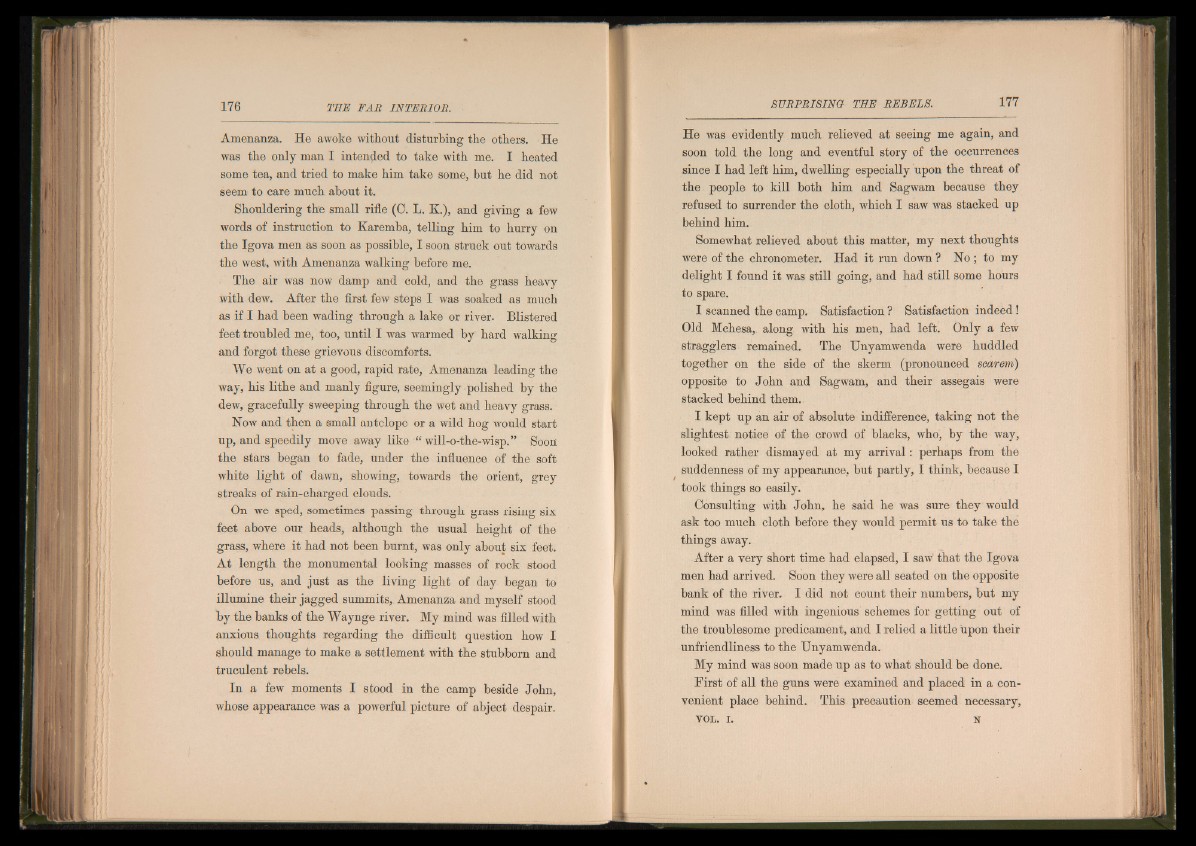
Amenanza. He awoke without disturbing the others. He
was the only man I intended to take with me. I heated
some tea, and tried to make him take some, but he did not
seem to care much about it.
Shouldering the small rifle (0. L. K.), and giving a few
words of instruction to Karemba, telling him to hurry on
the Igova men as soon as possible, I soon struck out towards
the west, with Amenanza walking before me.
The air was now damp and cold, and the grass heavy
with dew. After the first few steps I was soaked as much
as if I had been wading through a lake or river. Blistered
feet troubled me, too, until I was warmed by hard walking
and forgot these grievous discomforts.
We went on at a good, rapid rate, Amenanza leading the
way, his lithe and manly figure, seemingly polished by the
dew, gracefully sweeping through the wet and heavy grass.
Now and then a small antelope or a wild hog would start
up, and speedily move away like “ will-o-the-wisp.” Soon
the stars began to fade, under the influence of the soft
white light of dawn, showing, towards the orient, grey
streaks of rain-charged clouds.
On we sped, sometimes passing through grass rising six
feet above our heads, although the usual height of the
grass, where it had not been burnt, was only about six feet.
At length the monumental looking masses of rock stood
before us, and just as the living light of day began to
illumine their jagged summits, Amenanza and myself stood
by the banks of the Waynge river. My mind was filled with
anxious thoughts regarding the difficult question how I
should manage to make a settlement with the stubborn and
truculent rebels.
In a few moments I stood in the camp beside John,
whose appearance was a powerful picture of abject despair.
He was evidently much relieved at seeing me again, and
soon told the long and eventful story of the occurrences
since I had left him, dwelling especially upon the threat of
the people to kill both him and Sagwam because they
refused to surrender the cloth, which I saw was stacked up
behind him.
Somewhat relieved about this matter, my next thoughts
were of the chronometer. Had it run down ? No ; to my
delight I found it was still going, and had still some hours
to spare.
I scanned the camp. Satisfaction ? Satisfaction indeed!
Old Mchesa, along with his men, had left. Only a few
stragglers remained. The Unyamwenda were huddled
together on the side of the skerm (pronounced scarem)
opposite to John and Sagwam, and their assegais were
stacked behind them.
I kept up an air of absolute indifference, taking not the
slightest notice of the crowd of blacks, who, by the way,
looked rather dismayed at my arrival: perhaps from the
suddenness of my appearance, but partly, I think, because I
took things so easily.
Consulting with John, he said he was sure they would
ask too much cloth before they would permit us to take the
things away.
After a very short time had elapsed, I saw that the Igova
men had arrived. Soon they were all seated on the opposite
bank of the river. I did not count their numbers, but my
mind was filled with ingenious schemes for getting out of
the troublesome predicament, and I relied a little upon their
unfriendliness to the Unyamwenda.
My mind was soon made up as to what should be done.
First of all the guns were examined and placed in a convenient
place behind. This precaution seemed necessary,
VOL. I. n